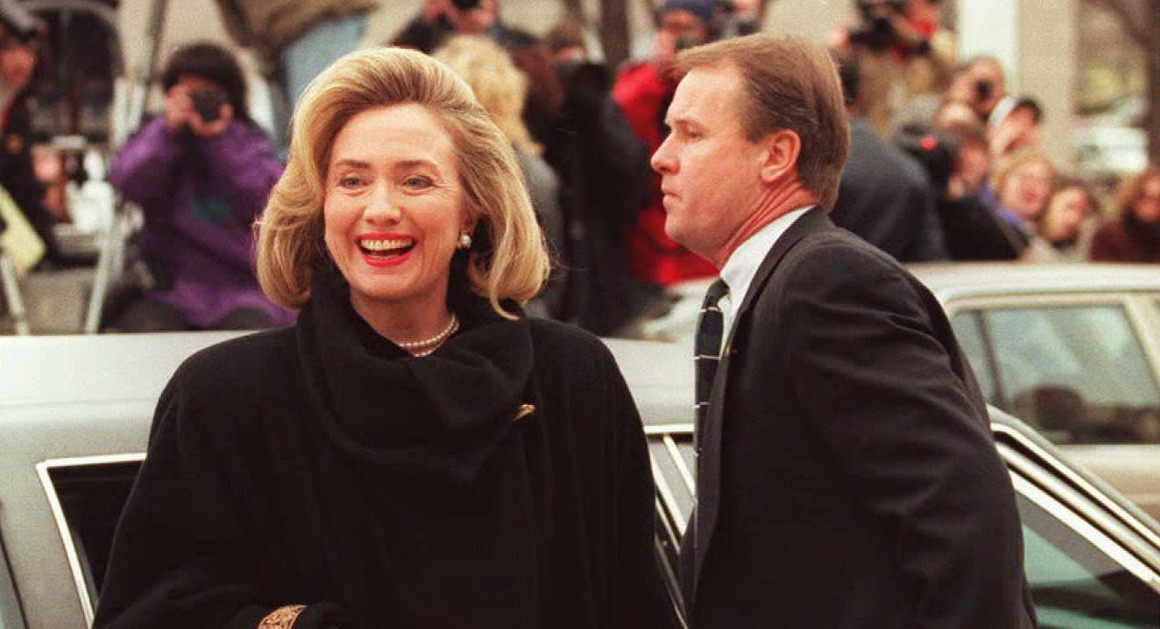
Hillary-hunters beware. On Thursday, when Hillary Clinton testifies before the Benghazi Committee, she will probably demonstrate the experience, poise and partisan steeliness that won last week’s Democratic debate. For more than two decades, this tough political veteran has testified before unfriendly congressional hearings and hostile grand juries. And over the years, she has proved to be as resilient, partisan and adaptable as her husband, who once described himself to his rival Newt Gingrich as “the big rubber clown doll you had as a kid. ... The harder you hit me, the faster I come back.”
Hillary Clinton typically unnerves enemies and thrills fans with a soft if somewhat stagy Hillary touch tempering the classic Clinton counterattack she’s mastered, charging Republicans with flagrant partisanship and personal attacks. Exhibit One: During Benghazi testimony in January 2013, then-Secretary of State Clinton teared up when recalling how she comforted the survivors of the four Americans murdered by the Libyan Islamist terrorists on September 11, 2012, then tore into Republicans, making them seem bullying and nit-picky over the question of whether the deaths happened as a result of an Islamist radical protest or a terrorist plot. “We had four dead Americans,” she snapped. “At this point, what difference does it make?”
The news this week was that Hillary Clinton was taking time from her presidential campaign to prep for her Benghazi testimony—but in fact she’s been prepping at least since 1993, when, during the high-stakes Clinton health care reform fight, President Bill Clinton dispatched his wife to testify before Congress. Americans had never had a first lady like this, a supersmart career woman with a law degree who was nevertheless deriving power from her “Mrs. Degree,” trying to be co-president. “This is Eleanor Roosevelt time,” one aide exulted. Clinton’s authoritative but deferential performance prompted a rare standing ovation.
She’d been equally impressive a decade earlier, when she testified for the Clintons' Arkansas education reform in 1983 and one legislator cracked, “It looks like we've elected the wrong Clinton.” Now, the crusty Dan Rostenkowski said, “I think in the very near future the president will be known as your husband.” The first lady smiled politely. The New York Times reported, awkwardly, that Mrs. Clinton “captivated and dominated two usually grumpy House Committees.”
Despite that triumph, and subsequent polls showing her being twice as popular as her husband, the health care reform effort failed, partially due to a backlash fueled by fears that an unelected first lady with no constitutional authority was seizing too much power. Defeated, Clinton retreated into a more traditional role. In January 1996, she launched an 11-city tour to promote her book It Takes a Village, articulating the Clintons’ centrist vision combining individual and communal responsibility—what she now calls her progressivism tempered by moderation.
It Takes a Village reflected Hillary Clinton’s cautious new makeover, with chapter headings like “Security Takes More Than a Blanket” and “Child Care Is Not a Spectator Sport.” The occasionally prickly power-player had become a safe mom and cliché-maker.
All the love she received on the road convinced the first lady that there was a huge “disconnect between Washington and the rest of the nation.” She noted how “ineffectual the increasingly partisan rhetoric in Washington was in solving the problems that these children face.”
Yet even then the first lady’s tour was haunted by the Whitewater scandals—which began with allegations of conflicts of interest rooted in a failed Arkansas real estate investment. In a cruel twist—or a poorly executed manipulation—on January 5, as the tour began, the Clintons’ secretary announced she had stumbled onto a box in the “book room,” deep in the Clintons’ private domain, the Executive Mansion. The box contained long-sought billing records detailing the legal work Hillary Clinton and her Rose Law Firm colleagues did for the Madison Guaranty savings and loan at the heart of the Whitewater scandal.
Five investigative bodies had been requesting those records, some for as long as two years. The bills conveniently appeared two days after the statute of limitations expired, so that bank regulators could not sue the Rose Law Firm or any attorneys involved in the bank’s $60 million bankruptcy.
Mrs. Clinton had insisted that she remembered little about what was an insignificant case. The records showed otherwise, proving that Hillary Clinton, Esq., had worked 60 hours over 15 months, averaging an hour a week, on this file, with over a dozen meetings. Her claim that this proved that the file was forgettable meant that this supposed superlawyer was invoking a defense of borderline malpractice to dodge more serious charges of dishonesty and fraud. Ronald Reagan had made a similar choice when defending himself during the Iran-Contra scandal. Ultimately, like the 18½-minute gap with Watergate, the sudden surfacing of the long-sought billing records would remain a mystery: Were they genuinely misplaced or purposely overlooked? How did they suddenly emerge? “Nobody knows the real story with the billing records,” the White House counsel and Whitewater troubleshooter Jane Sherburne would say with a sigh.
The fallout was considerable. Her book tour yielded distracting, demoralizing questions. Newsweek ran a cover story on Hillary Clinton, promoting book excerpts while asking “SAINT OR SINNER?”
- Publish my comments...
- 0 Comments
